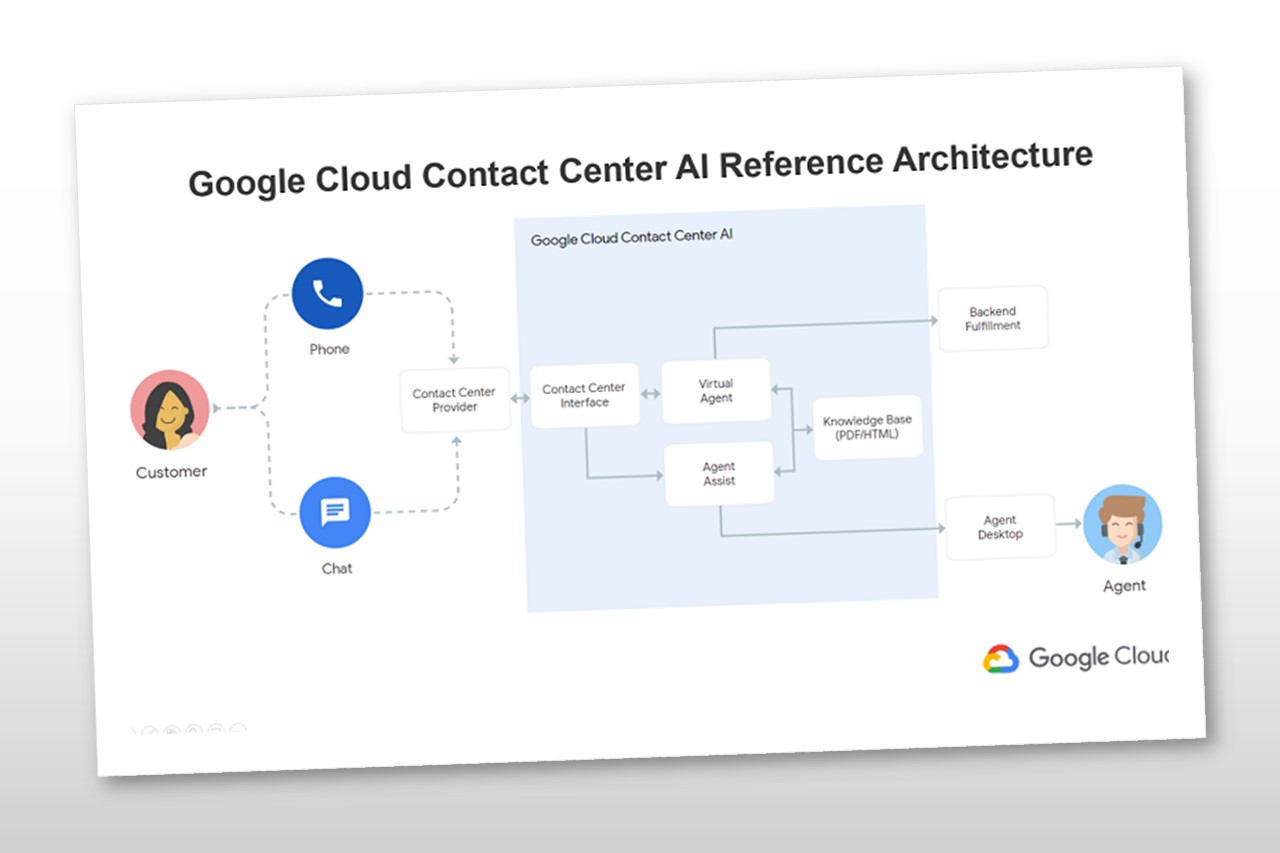It’s an understatement to say that in July 2018 I was excited about Google’s entrance into the contact center market. First I wrote a post on how
Vonage customer American Financing was testing Google Contact Center AI (CCAI) capabilities in a proof-of-concept project. I then created a
slideshow describing how many other premises and cloud contact center companies were working with Google to bring its artificial intelligence (AI) expertise to the customer experience use case.
The graphic above shows the reference architecture for CCAI. At the heart of the solution, has always been Dialogflow, Google’s core technology for building chatbot, interactive voice response (IVR), and other interfaces that enable natural and rich conversational experiences (see the No Jitter series,
Decoding Dialogflow, for a deep dive). Available for the past two years, Dialogflow has reached over one million developers. During that time, Google has added capabilities, including HIPAA and PCI compliance support, and enhanced Virtual Agent support.
Companies have been able to build virtual agents using Dialogflow for some time. Think of Google’s Virtual Agent as a chatbot capability for automating basic interactions and providing handoffs to human agents for more complex issues.
The most complex part of CCAI is Agent Assist, which empowers live agents with continuous support during their calls. It can transcribe calls in real time, identify the intent of a customer’s interaction, provide real-time, step-by-step assistance (recommended articles, workflows, etc.), and automate call dispositions — i.e., create notes of what happened on the call. Agent Assist is what became generally available yesterday and is now available to work in concert with Virtual Agent.
In its
announcement blog, Google highlighted that CCAI integrations with Avaya and Mitel also became generally available this week. Integrations with other contact center partners — 8x8, Cisco, Five9, Genesys, Salesforce, Twilio, and Vonage — will become available as each company finalizes its internal productization procedures.
In a one-on-one briefing, Antony Passemard, Google’s head of conversational AI and author of the announcement blog, highlighted a couple of aspects of the announcement for me. One is agent validation, now an integral part of Dialogflow. By providing feedback with a list of errors or warnings that designers should fix in their virtual agents, agent validation helps to improve the virtual agents’ performance and improve the quality of the overall experience.
One thing that agent validation does is provide a view of intent matching — i.e., what users are asking the virtual agent, or bot, to do. This lets the designer know which intents are most used and where people may be giving up and abandoning the bot. It can also flag whether two intents may be overlapping and thus leading to virtual agent confusion.
In his blog, Passemard described fuzzy matching, providing more details in our conversation. Another way to think of fuzzy matching is as speech adaptation, he said, something that only Google does today. Fuzzy matching “is a way to bias the speech recognition model towards certain words, a way to specify the word you want the model to recognize more,” he told me. For example, fuzzy matching can be very useful for proper names. The impact is to have a much higher recognition rate, and therefore a better performing bot.
Lastly, Passemard told me that CCAI is now available in U.K. English, Australian English, as well as Spanish and Russian, with additional languages in the pipeline. Until recently, he noted, it had only been available in U.S. English.
No doubt, AI in the contact center continues to be a hot topic. To learn more about Google Cloud’s approach, join me for a
Contact Center AI: Fireside Chat with Matt Jones, Google Cloud’s Conversational AI product manager, and Celeste Grade, alliance relationship manager, hosted by Enterprise Connect, on Nov. 25, 2:00 p.m. to 3:00 p.m., to hear more.
Save your seat!










